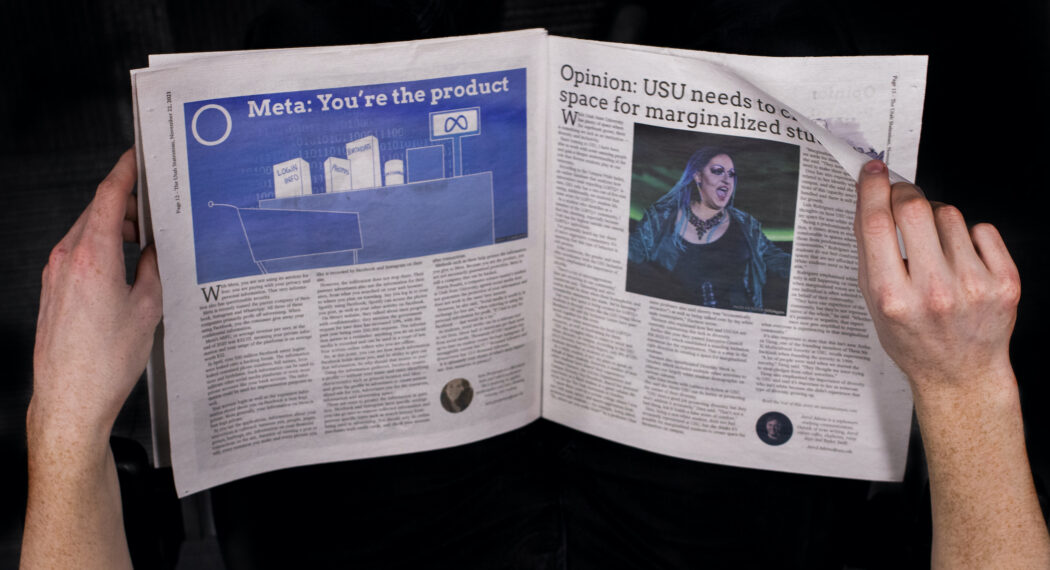Opinion: Be more responsible with your news consumption
From their social media platforms to their classrooms, awareness is important to Utah State University students. But it means little without action.
It is not enough to only pay attention when headlines are flashing in your face on social media to be civically engaged and aware of modern politics. Instead, keep up to date on national and international issues consistently with reliable sources and be proactive.
On Feb. 11, President Biden said in the immediate future, days even, Russia would be invading Ukraine. Since the beginning of 2021, Russia has been building up forces outside of Russia and, in late January, had deployed 130,000 troops near the Ukrainian border.
While many news articles were just stipulation on whether the attack would happen, by February it became a question as to when, not if.
For what could be the most dangerous national security crisis since the Cold War, social media cannot be the sole source of news for college students. It is unreliable and a delayed source. Instead, students should be up to date consistently with verified news sources.
“I think the best thing students can do is to expand their view and consume a healthy, balanced news diet,” said Damon Cann, a USU political science professor, over email. “If you choose a partisan news source, you really ought to get outside of that and try to read what a variety of people are saying on a subject.” It is important when reading the news to branch out to avoid bias.
Colin Flint, a USU international studies professor, described social media as a good place for discourse and discussion, but it should not be where your news originates from, as it is not thorough and can have strong biases.
“Social media posts are rarely longer than 50 words, and on graphically driven outlets like Instagram and Snapchat, words are even more sparse,” Cann said in an email. “A social media video longer than two minutes is an eternity (and 30 seconds is the max for Twitter).”
That is too short of a time and lacks depth and substance. It can be affected by the individual posting it as well.
“You may see Sting’s campaign to raise money to benefit Ukrainian refugees, which went viral for his re-release of his song ‘Russians,’” Cann said in an email. “But you may not actually understand much about the history, the scope of the conflict and the stakes of the overall issue.”
Instead of spending time feeding into the social media frenzy by reposting graphics, there are significant ways you can contribute to causes such as these.
Fiscally, you can raise funds for Ukraine relief efforts, you can collect donations for refugees, you can donate to a reputable organization whose funds are going directly into the cause. Organizations such as Ukraine Red Cross, World Central Kitchen and Voices of Children are good to donate to.
However, as a college student, money is not always the best method for assisting. We are also too far for physical relief efforts and assistance in immediate refuge arrival to be practical. But there are ways to work around that.
Flint said proximity is not important for what students can do to contribute.
“Global issues are simultaneously local issues and acting locally is not a second choice for action. Most of the time it is the only one,” Flint said.
Local actions can range from reaching out to political representatives and expressing your thoughts on issues, to the economic ones. You as a consumer can make an impact in everyday purchasing decisions, like the West is doing as an economic war plan against Russia.
To act, you must be informed. Flint recommended an easy access resource that is available to all USU students, the Aggies Geopolitical Observatory, or Aggies GO. It is made by students for students with the intent of delivering unbiased, simplified news on global politics.
On the Russia-Ukraine conflict, geopolitical articles are a good source to understand the issue on another level.
Recently, on the USU International Studies website, Lauren Palmer released an article clarifying terminology commonly used in the media, as well as some historical context into the conflict.
As a writer for Aggies GO, Palmer picks topics with geopolitical concepts that are only partly about the event itself and more so about helping students make sense of the topic.
Palmer relies on her professors for learning about the topic firsthand and recommends other students to do the same. Many professors are specialists in the fields they are teaching and have a lot to offer students. They can have differentiating opinions and even refer students to other professors with different perspectives so students can get the whole scope of the topic.
Palmer also recommended subscriptions to news outlets. This gives students a wide range of information being delivered to them as opposed to just the headline hot topics. If students do not want to pay for a subscription but want to access that content, the USU library database gives students free access to local and national news sources.
From news sources, you can further research into more specific organizations dealing with the issue, such as the Center for Strategic and International Studies, which is a nonprofit policy research organization. They were creating briefs about the Russian invasions back in mid-January and gave breakdowns.
Most importantly, stay on top of the issue by being aware and reading or listening to different news outlets to hear different perspectives. This gives you a broader understanding of what is happening.
As Flint said, “Any source of news has a bias to it.” And it is your responsibility to avoid it.
—
Sara Prettyman is a Maryland-born-and-raised sophomore majoring in applied mathematics. She loves drawing, running and reading.
— A02342348@usu.edu
Featured photo by Bailey Rigby

